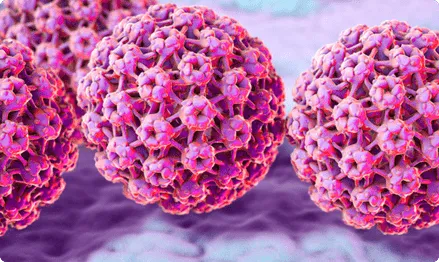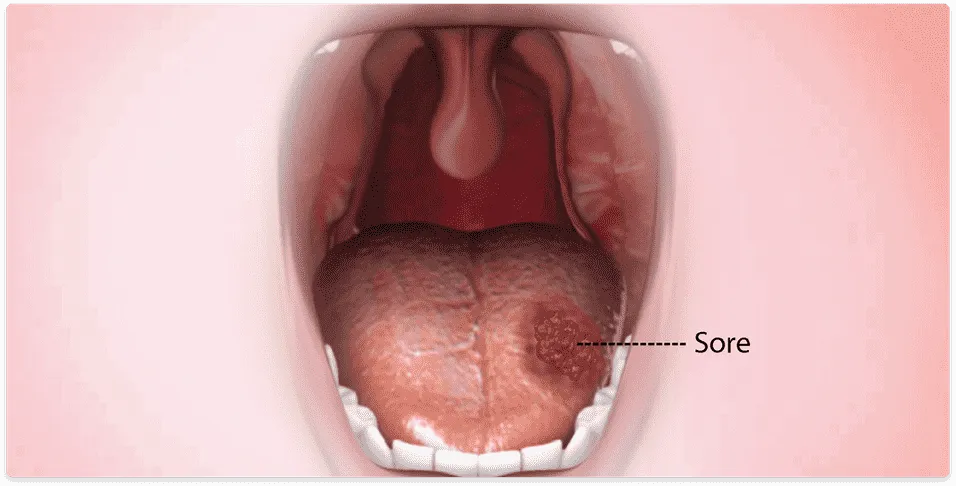Navigating the Indicative JourneyUnderstanding How to Diagnose Tongue Cancer?

Causes
Tongue cancer, a formidable adversary, often traces its origins to habitual behaviors and environmental factors. While smoking cigarettes and indulging in tobacco products top the list of perpetrators, alcohol consumption significantly exacerbates the risk.
Additionally, factors such as HPV (human papillomavirus) infection, compromised immune function, and oral thrush play significant roles in predisposing individuals to this malignancy. Lifestyle choices, including a diet rich in processed meats and deficient in fruits and vegetables, along with poor oral hygiene, further compound the risk.
Even seemingly innocuous habits, like frequent mouthwash use containing alcohol, may contribute to the development of tongue cancer. Genetic predispositions also play a pivotal role in shaping an individual's susceptibility to this disease.
To safeguard against this insidious threat, awareness is paramount. If you're concerned about your risk factors or notice any concerning symptoms, don't hesitate to seek guidance from a healthcare professional.
Take control of your health today. Schedule a consultation with Dr. Amit Chakraborty, a trusted expert in tongue cancer prevention and treatment. Let's confront this challenge together, empowering you to lead a healthier, cancer-free life.
Unveiling Tongue CancerRecognizing the Tell-tale Signs and Symptoms
Symptoms:
Tongue cancer often manifests through subtle yet persistent indicators, necessitating keen awareness for timely intervention. A primary Tongue cancer symptom is the presence of a persistent sore or lump on the tongue, unyielding to conventional remedies.
Beyond visible abnormalities, individuals may notice alterations in tongue appearance, such as lesions or ulcers, signaling potential malignancy. Difficulty in essential functions like swallowing, speaking, or tongue movement can also emerge, accompanied by discomfort or pain during these activities.
Moreover, sensations of numbness in the mouth or throat, along with an unusual metallic taste, may raise suspicion. Pain that radiates to adjacent areas like the ear, jaw, or neck warrants attention, as does unexplained weight loss.
While these tongue cancer symptoms may not definitively denote, their presence necessitates prompt medical evaluation. Don't overlook potential warning signs—seek professional guidance to ensure timely diagnosis and intervention.

Empower yourself with knowledge and proactive healthcare. Schedule a consultation with Dr. Amit Chakraborty, a distinguished expert in tongue cancer diagnosis and treatment. Together, let's navigate this journey towards optimal health and well-being.
Navigating Tongue Cancer Diagnosis
A Roadmap to Timely Intervention
Diagnosis
Embarking on the journey to diagnose tongue cancer begins with a crucial step: consulting your healthcare provider. During your visit, your doctor will delve into your symptoms through a comprehensive discussion and a meticulous physical examination. This thorough evaluation forms the cornerstone for accurate diagnosis and tailored treatment planning, ensuring you receive the best possible care and support throughout your journey to combat tongue cancer.
To further unravel the intricacies of the condition, additional diagnostic tests may be warranted. These may include

Armed with a definitive diagnosis, you and your medical team can collaboratively chart a tailored treatment trajectory. Remember, timely detection is pivotal in optimizing treatment outcomes. If you're grappling with concerning symptoms, don't delay—schedule a consultation with your doctor today to embark on the path to diagnosis and healing.

Unlock the path to HealingTailored Treatment for Tongue Cancer
Treatment
When facing tongue cancer, navigating the myriad treatment options can feel daunting. However, armed with knowledge and guidance from healthcare professionals, you can embark on a personalized treatment journey tailored to your unique needs.
Treatment modalities for tongue cancer encompass surgery, radiation therapy, and chemotherapy, with the optimal approach contingent upon factors such as the cancer's stage and severity:
- Surgery typically serves as the cornerstone of treatment, ranging from partial to total removal of the tongue (resection), contingent upon the cancer's stage and location. Advanced cancers may necessitate radical neck dissection to eradicate all cancerous tissue comprehensively.
- Radiation therapy, utilizing high-energy beams, is often employed in tandem with surgery, particularly for more advanced cancers. This therapy can be administered externally or internally via implants.
- Chemotherapy, harnessing potent drugs to combat cancer cells, is frequently integrated with radiation therapy, either intravenously or orally, especially for advanced cases.
The optimal treatment path is charted through collaborative efforts between you and your medical team, considering the cancer's stage, severity, and your preferences. While surgery typically forms the initial treatment modality, radiation therapy and chemotherapy may also be advised. In certain instances, a combination of these approaches may be indispensable to achieve optimal outcomes.
Don't navigate this journey alone—reach out to your healthcare provider today to embark on a tailored treatment plan, paving the way toward healing and restoration.
Exploring Tongue Cancer Treatment Understanding Potential Side Effects
Side Effects:
Navigating tongue cancer treatment involves understanding the potential side effects associated with each treatment modality. These side effects vary depending on the chosen approach.
- Surgery, a common treatment option, may lead to post-operative discomfort, swelling, and challenges in speech.
- Radiation therapy, another common treatment, can trigger adverse reactions such as nausea, vomiting, and diarrhea.
- Chemotherapy, often used in conjunction with radiation therapy, may result in hair loss, fatigue, and mouth sores.
It's crucial to engage in thorough discussions with your healthcare provider about potential side effects before commencing any treatment regimen. Equipping yourself with knowledge about the possible repercussions of tongue cancer treatments empowers you to make informed decisions about your care.
Prioritize open communication with your tongue doctor in Mumbai to gain a comprehensive understanding of potential side effects and tailor your treatment plan accordingly, ensuring the best possible outcome.

Revealing
What are the Risks of Tongue Cancer?
Risk
Tongue cancer, although uncommon, poses significant risks that individuals should be aware of, particularly as they age. Alongside aging, several factors contribute to the likelihood of developing this disease. Recognizing these risks is crucial for taking proactive measures towards prevention and early detection.
Age

Like many cancers, the risk of tongue cancer tends to rise with age. While it can manifest at any age, it is more prevalent among individuals over 40.
Tobacco Use

Smoking cigarettes, cigars, or pipes, as well as using smokeless tobacco products, substantially heightens the risk of tongue cancer. Tobacco contains carcinogens that can harm tongue cells, leading to cancerous growth.
Alcohol Consumption

Excessive alcohol intake is another significant risk factor for tongue cancer. Prolonged and heavy alcohol consumption can irritate tongue cells, increasing the likelihood of cancer development.
Human Papillomavirus (HPV) Infection

Certain strains of HPV, particularly HPV-16, have been linked to an increased risk of tongue cancer. HPV transmission through oral-genital contact can contribute to cancer formation.
Poor Oral hYgiene

Neglecting proper oral hygiene, including regular brushing, flossing, and dental check-ups, can contribute to tongue cancer risk. Poor oral hygiene fosters bacterial accumulation, potentially leading to chronic inflammation and cell damage.
History of Head and Neck Radiation Therapy

Individuals who have undergone radiation therapy for prior head or neck cancers may face an elevated risk of tonguecancer later in life. Radiation therapy can damage healthy cells, predisposing them to cancerous growth.
Genetic Factors

While less common, certain genetic conditions and predispositions may contribute to tongue cancer development. Individuals with a family history of oral cancers may have an increased risk due to inherited genetic mutations.
Take Charge of Your Health
Understanding tongue cancer risks empowers individuals to make informed decisions about their health and lifestyle choices. Addressing modifiable risk factors such as smoking and excessive alcohol consumption can lower the likelihood of tongue cancer.
Regular dental check-ups and oral cancer screenings are crucial for early detection and intervention. If any concerns about oral health arise or unusual changes in the tongue, consult a healthcare professional promptly.
Together, we can raise awareness, promote prevention, and support early detection efforts to combat tongue cancer. Take proactive steps today for a healthier tomorrow.

Insights and Outlook What is the Prognosis of Tongue Cancer?
Prognosis:
Understanding the prognosis of tongue cancer offers crucial insights into potential outcomes. While statistics provide a general overview, individual prognoses are influenced by various factors.
- Survival Rates: Tongue cancer typically carries a five-year survival rate of around 50%, with a ten-year survival rate of approximately 30%.
- Factors at Play: Prognosis hinges on factors like cancer stage, treatment response, and overall health. Advancements in treatment, including targeted therapies, hold promise for improving outcomes.
- Empowered Decisions: Stay informed about your prognosis, but remember, each case is unique. Open communication with healthcare providers and proactive involvement in treatment decisions can positively impact outcomes.
Take Charge of Your Health: Facing a diagnosis of tongue cancer, consult with a healthcare professional - navigate your journey toward optimal health.
FAQs
-
Q: What is tongue cancer?
Tongue cancer is a type of cancer that starts as a growth of cells on the tongue. The tongue begins in the throat and extends into the mouth, made up of muscles and nerves that help with movement and function, such as taste
-
Q: What are the risk factors for tongue cancer?
The biggest risk factors are heavy tobacco and alcohol use. Other risk factors include the human papillomavirus (HPV), oral pre-cancer lesions, betel quid use, ultraviolet light, excessive sun exposure, and certain genetic syndromes
-
Q: What are the side effects of tongue cancer treatment?
Treatment can cause side effects such as pain, difficulty eating or swallowing, numbness, and changes in speech. It is important to communicate with your medical team about any concerns or symptoms you experience
-
Q: How can I reduce my risk of tongue cancer?
You can reduce your risk by not using tobacco, limiting alcohol consumption, increasing fruit and vegetable intake, reducing stress, and exercising regularly
-
Q: Can tongue cancer be cured?
The chance of cure for tongue cancer depends on the stage and type of cancer. Most cancers will come back within the first two years of treatment, but if someone gets to five years after treatment with no sign of cancer, the chance of it coming back is very low
